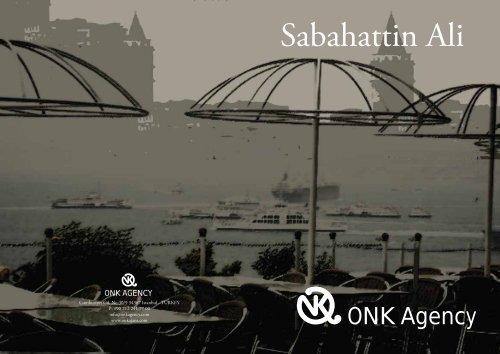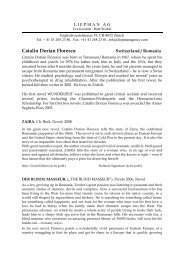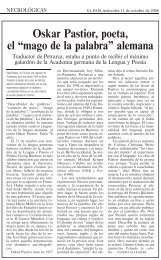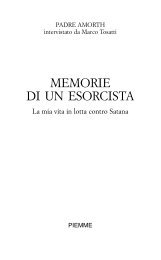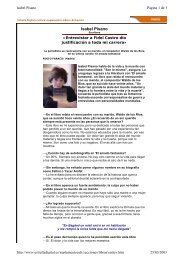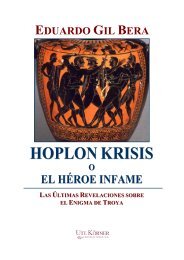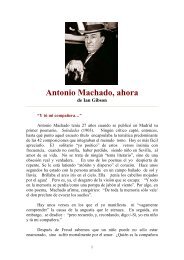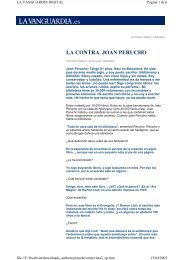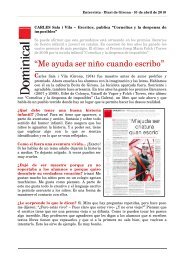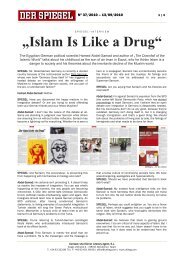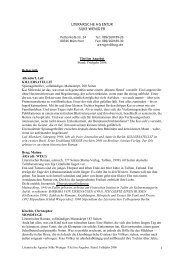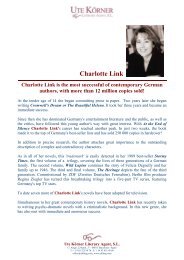Dossier | Sabahattin Ali
Dossier | Sabahattin Ali
Dossier | Sabahattin Ali
You also want an ePaper? Increase the reach of your titles
YUMPU automatically turns print PDFs into web optimized ePapers that Google loves.
<strong>Sabahattin</strong> <strong>Ali</strong><br />
ONK AGENCY<br />
Cumhuriyet Cd. No:30/9 34367 Istanbul - TURKEY<br />
P: +90 212 241 77 00<br />
info@onkagency.com<br />
www.onkajans.com<br />
ONK Agency
The Devil Within<br />
İçimizdeki Şeytan<br />
The Fur Coated Madonna<br />
Kürk Mantolu Madonna<br />
Yusuf the Taciturn<br />
Kuyucaklı Yusuf<br />
<strong>Sabahattin</strong> <strong>Ali</strong> was one of the leading authors of the<br />
early years of the Turkish Republic. Educated in<br />
Turkey and Germany, his literary output consists of<br />
three novels, five collections of short stories, a<br />
collection of poems and a posthumous collection of<br />
political articles in addition to numerous translations<br />
from world literature. He was the owner and<br />
editor of a very popular weekly newspaper called<br />
"Marco Pasha" which, with its political and satirical<br />
editorials, became a target of the government<br />
during 1940s. His works are focused on rural, social<br />
and psychological realities of Anatolia as well as on<br />
the urban pseudo-intellectual circles of Istanbul and<br />
Ankara. He was a strong believer of socialism and<br />
was imprisoned more than once for his political<br />
views and writings. <strong>Sabahattin</strong> <strong>Ali</strong> was assassinated while allegedly secretly crossing the border to Bulgaria.<br />
Why, where, by whom he was murdered and where he was buried is still a mystery.<br />
International Publications:<br />
French:<br />
Kuyucaklı Yusuf / Youssouf Le Taciturne (Serpent à Plumes - Fransa)<br />
Kürk Mantolu Madonna / La Madonna au Manteau De Fourrure (Serpent à Plumes-Fransa)<br />
German:<br />
Kürk Mantolu Madonna / Die Madonna im Pelzmantel (Dörleman -Switzerland)<br />
İçimizdeki Şeytan / Der Dämon in Uns (Unions Verlag–Switzerland)<br />
Russian:<br />
Fur Coated Madonna (Ad Marginem Press - Russia)<br />
Albanian:<br />
Fur Coated Madonna (Shkupi Publishing House-Macedonia)<br />
Yusuf the Taciturn (Shkupi Publishing House-Macedonia)<br />
Arabic:<br />
Fur Coated Madonna (Sphinx Publications - Egypt)<br />
Croatian:<br />
Fur Coated Madonna (HENA COM-Croatia)<br />
Upcoming International Publications:<br />
Albanian:<br />
The Devil Within (FAN NOLI Publishing House-Albania)
"The Devil Within" can be read as a life lesson book. There are many pages which<br />
point out how obscure politics can cause people to destroy one another. This kind<br />
of politics never permits the individual to develop and treats those who wish to<br />
leave the ‘herd’ of believers in a pitiless fashion. Selim İleri, foreword for ‘The Devil<br />
Within’ published by Yapı Kredi Publications 1998.<br />
The Devil Within<br />
İçimizdeki Şeytan<br />
Ömer, a twenty five year old young man , living in Istanbul, has a job at the Post<br />
Office and is an occasional student at the university. On a summer day, he meets an<br />
elderly woman, Emine, from his hometown, and Macide, a young relative. Ömer<br />
falls in love with Macide, who has great passion for music and attends a conservatory<br />
in Istanbul. When her father dies, Macide is deprived of the money for her<br />
lodgings. Feeling unwanted, Macide packs her belongings and leaves. Ömer takes<br />
her to his boardinghouse and they start living together. Ömer, in a milieu of<br />
right wing pseudo-intellectuals who have leanings towards fascism, damages his<br />
personal life and his relationship with the woman he loves. They encounter Bedri, a<br />
young piano player. Bedri, an old friend of Ömer, happens to be Macide’s music<br />
teacher at high school. He becomes a friend of the family, supporting them morally<br />
and economically. Ömer, a well intentioned but weak character, steadily deteriorates<br />
within a milieu where he doesn’t fit and in a dramatic fashion ends up in<br />
prison. The day he is to be released Bedri visits him and tells of his relationship with<br />
Macide. After a long conversation Ömer decides to leave them to each other. The<br />
novel describes the social and political tendencies of the university and art milieu<br />
before the Second World War. It is a criticism of the intellectuals of the époque.<br />
Inspired by the events of his own life, <strong>Sabahattin</strong> <strong>Ali</strong> describes the life of the<br />
Istanbul bohemians in a distinctly unromantic manner. The character Ömer, even<br />
as he belittles those aspiring poets and journalists who do their utmost to besmirch<br />
their ostensible political opponents, can’t divorce himself from them and their<br />
bohemian life style. He neglects Macide and enters into increasingly dubious<br />
relationships. To escape from poverty he commits a crime and then attempts to<br />
blame the ‘devil within’.<br />
Fokke Joel - Neues Deutschland<br />
With the novel ‘The Devil Within’, the writer moves from Anatolia to Istanbul.<br />
Before the 2nd World War, the ideological conflict between the university intellectuals<br />
of Istanbul; the consequent arguments, the social and political direction of<br />
thinking that began in artistic circles and depressions sparked by arguments, were<br />
reflected within a love story. <strong>Sabahattin</strong> <strong>Ali</strong> described the intellectual circles.<br />
Olcay Önertoy<br />
In ‘The Devil Within’, <strong>Sabahattin</strong> <strong>Ali</strong> maintains that we all have a propensity to<br />
have a devil within and a capability of doing evil. An example is Ömer. Without a<br />
doubt this is not a general rule and surroundings are influential too. For this reason<br />
Nihat, Prof Hikmet and his friends are given as examples of his circle of friends.<br />
<strong>Sabahattin</strong> <strong>Ali</strong> was a realist and used the political events of his time. While he<br />
exposes the inner dynamics of the subjects he deals with, their mistakes and<br />
dishonourable acts. He takes Ömer as his subject matter and charts the changes he<br />
goes through. Although a member of the group, he is not actually part of it.<br />
Atilla Birkiye, Yazko Literature Magazine<br />
Greek:<br />
French:<br />
German:<br />
The book has done five editions in Turkey in the last twelve months.<br />
(25,000 copies)
One of the people I came across has probably impressed me more than anyone else I’ve ever<br />
met.” That’s the starting sentence of the novel, where the author first tells the story of his<br />
friendship with “Raif Efendi” and then starts to read his diary, a black notebook, which Raif<br />
had entrusted to him on his deathbed. The first page of the diary is dated June 20, 1933.<br />
Raif’s father, a soap manufacturer in Turkey, sends him to Berlin for training.. Having no<br />
interest in soap manufacturing, being artistically inclined, Raif strolls through the town and<br />
in an exhibition hall he sees a self-portrait of a painter, namely Maria Puder, entitled “Madonna<br />
in A Fur Coat.” He is transfixed by the portrait and introduces himself to the painter<br />
when she visits the exhibition. They soon become lovers. Raif is called back to homeland due<br />
to the sudden death of his father.<br />
The Fur Coated<br />
Madonna<br />
Kürk Mantolu Madonna<br />
However, the war starts stranding Raif in Turkey and disrupting the correspondence of the<br />
two lovers. The distance apart and the lack of communication separates them completely. Ten<br />
years pass. Raif is married to a woman whom he does not love and has a job as an insignificant<br />
clerk..<br />
He encounters an old acquaintance in Ankara, a German woman, who was a neighbor of the<br />
boarding house where he had stayed during his Berlin days and a distant relative of Maria<br />
Puder. Raif finds out from her that after his departure, Maria had given birth to a baby- their<br />
daughter- and then had died a week later. He is shocked and left with feelings of a life<br />
wasted, he is full of regrets.<br />
The book has done eight editions in Turkey in the last twelve months. (40,000 copies)<br />
‘The Fur Coated Madonna’ is a love story. Passionate but clear, bounding to life but destined<br />
to death; full of hope yet ultimately a hopeless love story. There lies the secret to <strong>Sabahattin</strong><br />
<strong>Ali</strong>'s success: his ability to describe the emergence of a feeling, seemingly straightforward<br />
from the outside but swinging back and forth between opposite extremes at its core, revealing<br />
the tensions that accompanies such rises and falls.<br />
Attila Özkırımlı<br />
<strong>Sabahattin</strong> <strong>Ali</strong> while writing the novel ‘The Fur Coated Madonna’ used Maria Puder as his<br />
model as if she were his ideal woman. The woman in question is defined via her relationship<br />
with men. Maria is unable to tolerate being dominated by men. She’s not used to the traditional<br />
expectancy of women being reliant on men and obeying them. She’s a self-sufficient<br />
and independent woman. As <strong>Sabahattin</strong> <strong>Ali</strong> considered that to create such a Turkish female<br />
character would not have been realistic, he depicted Maria as a German.<br />
Nüket Esen<br />
German Russian French Turkish
Yusuf the Taciturn<br />
Kuyucaklı Yusuf<br />
<strong>Sabahattin</strong> <strong>Ali</strong>'s most popular novel takes place in a small rural western Anatolian<br />
town near the Aegean Sea. A perfect description of the injustice of the<br />
ruling classes and dilemmas faced by a naive and pure human being are told via<br />
the tragic story of Yusuf, intermingled with great observations of nature. The<br />
novel is about the universal human tragedy of love, hatred, corruption, betrayal,<br />
murder and feelings of futility.<br />
The book has done seven editions in Turkey in the last twelve months.<br />
(35,000 copies)<br />
<strong>Sabahattin</strong> <strong>Ali</strong>'s mastery becomes evident in his sorting out of the details and<br />
their arrangement. Historical and social events such as the declaration of the<br />
Constitution, the Balkan War, and mobilization are given, inasmuch as they<br />
impact the life style within a town. The description of the milieu is conscribed<br />
by the realities of the characters. The social structure becomes noticeable during<br />
the development stages of events. Atilla Özkırımlı<br />
Sabahttin <strong>Ali</strong>’s novels are few in number they are rich in quality. Both ‘Yusuf the<br />
Taciturn’ and ‘The Devil Within’ are among our most successful novels. The<br />
similarities of these two novels are as follows; both are Turkish novels unadulterated<br />
in terms of surroundings and in spirit; both concern traditional values.<br />
One of them describes the way of life and spirit of an Anatolian town, the other<br />
brings to life a small group of intellectuals. Vedat Günyol<br />
<strong>Sabahattin</strong> <strong>Ali</strong> was a realist at a time when it was the hardest period to speak of<br />
reality. The interest and influence he generated during his time, thirty or forty<br />
years later retains the same impact which is evidence of the timeliness of his life<br />
as a writer.<br />
Rauf Mutluay<br />
We could say that 'Yusuf the Taciturne,' was the first true example of an Anatolian<br />
novel. The opening sentence, "a rainy night in the Autumn of 1903,<br />
outlaws raided the village of Kuyucak, close to the Nazilli district of Aydın,"<br />
specifies the period the book describes. Concluding in the district of Edremit<br />
and its surroundings, while telling a love story it also gives a good description of<br />
the social structure of a western Anatolian town opening up to development.<br />
The novel gives impressions of the places and surroundings where the writer<br />
grew up and exposes details of his life there. Olcay Önertoy<br />
I can’t help but ask myself if <strong>Sabahattin</strong> <strong>Ali</strong> were alive today would he have been<br />
able to find "the places he was seeking" or he would realised that words are not<br />
sufficient to change the world and he would have escaped like 'Yusuf the<br />
Taciturn.' Sulhi Dölek<br />
French:<br />
French:<br />
Turkish:
ABOUT ONK & TEDA<br />
Osman N. Karaca established ONK AGENCY in 1959 while working as a journalist. Although various<br />
companies had previously existed to market photographs, feature articles and comic strips, ONK was the<br />
first agency in Turkey that dedicated to the handling of copyright issues relating to literature and drama.<br />
Initially the Agency faced difficulties as the Turkish Copyright Law was very new and the entire concept of<br />
‘copyright’ was alien to the world of publishers and theaters. The accomplishments and current status of the<br />
Agency have been achieved despite such obstacles.<br />
In all modesty, ONK Agency has had considerable success in placing the works of foreign authors and<br />
playwrights with Turkish publishers and theatres as it continues to do today. Today, ONK Agency concludes<br />
approximately 300 contracts annually pertinent to book rights, 150 to dramatic rights and 60 contracts<br />
concerning other rights.<br />
However, it would not be fair to say ONK Agency has had the same success introducing and placing the<br />
works of Turkish authors internationally. It is true that in various countries Turkish works have been<br />
published through the efforts of the Agency but the number is still less than what actually can be achieved.<br />
‘‘The devil within ourselves<br />
is a not-so-cunning excuse.’’<br />
However, Turkish Ministry of Culture has undertaken a new initiative as of 2005 with the aim of<br />
introducing Turkish literature to foreign countries similar to the efforts of the culture ministries of countries<br />
such as France, Germany, Italy, Spain, the Netherlands, Ireland and Israel. The Ministry of Culture operating<br />
under the organizational name of T.E.D.A (Translation Subvention Project) aims to bring Turkish<br />
literature to a broader audience and provide better recognition of Turkish culture around the world. To<br />
achieve this it has instituted a program that subsidizes translation support to foreign publishers who decide<br />
to publish Turkish classical and modern literary works. We strongly believe that this program has<br />
encouraged foreign publishers to look more warmly upon such projects and given them a better insight<br />
about Turkish literary works. Indeed, as a result of the T.E.D.A initiative, ONK Agency has succeeded<br />
placing over 70 titles by Turkish authors with foreign publishers. The Ministry also provides grants to<br />
leading foreign publishers to assist the translation, editing, publication and promotion of books relating to<br />
Turkish culture, art and literature provided that such books are published outside of Turkey in languages<br />
other than Turkish.<br />
An advisory committee set up by the Ministry meets at least twice annually (in June & October of each<br />
calendar year). The committee consists of seven members from Turkey’s academic and literary world with<br />
the undersecretary from the Ministry of Culture (or his deputy) and the director general of libraries and<br />
publications as ex-officio members.We have included information about project T.E.D.A. in our Agency<br />
brochure as it is our wish to be of assistance to our foreign friends worldwide. Applications for grants maybe<br />
made by interested foreign publishers directly to the Turkish Ministry of Culture and Tourism by registered<br />
post to the address given below. For more detailed information about the TEDA project please visit<br />
www.tedaproject.com and the Ministry’s website at www.kulturturizm.gov.tr<br />
TURKSIH MINISTRY OF CULTURE & TOURISM<br />
Kütüphaneler ve Yayinlar Genel Mudurlugu<br />
Necatibey Cad. No.55 Kizilay 06440<br />
Ankara - TURKEY


